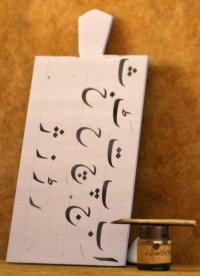Originally posted on 9 June 2011 :
For my grey haired friends, I am giving below a link to a picture of the writing materials which we used when paper was scarce and ‘ball point pens had not yet been invented. The fingers used to be soiled with ink, and the mothers had a tough time washing ink on our clothes.
Indeed, we lived in a ‘PAPERLESS’ age! See how the clock has turned a full circle!
As I sit before my laptop, I find that I have no paper. In place of the inkpot and the pen, there is printer. At the end of any session, I can erase any thing I feel like, with the click of a button! The clock has turned a full circle!









Please I want this
Certainly the world of writing has turned full circle. There is now even a tablet app for teaching-practicing handwriting, and erasing the whole wriiten page in one instant: https://handwritingsuccess.com/app/ … so the tablet is really the new takhti.
Excellent idea, Sir but don’t Kapil Sibal hear about it or for that matter Obama!
I, too, got a takhti when I was very, very young… I never really used it (except as bat). But I know that my cousins in HP used to use it all the time. My mamaji was a teacher in HP and they lived in several small villages and they used to write on takhti with kalam and a sort of ink that they prepared themselves and then they used to wash it with a sort of soap.
They had pens, pencils and copies, etc. but they used it… it looked soooooooo beautiful
My takhti was a hobby their was imposed by the school. Guess it was like not being allowed to use pen before class 5th and even then my teachers insisted that we use an ink-pen instead of ball pen because according to them it was much better for hand-writing.
In France, children start writing with ball-pens immediately. BTW the French people have a strange way of holding pens/ pencils. They don’t use their index finger like we do. And there are some differences in our hand-writing. In fact you can tell easily when one hasn’t used index finger to write. Does it result from the fact that parents don’t hold hands of their children to show them how to write? I remember that for a loooooooong long time my parents used to hold my hand and that’s how I learnt how to write. Here children don’t use cursive writing books and all those things. They write on mathematics/ graph type notebooks (I can never really write on such notebooks).
Just some random thoughts.
BTW I attended an interesting seminar at the univ here. It was about India. There was a session about the lady who founded the Aurobindo Ashram (Maataa Mirra) and then another one about a Jew French woman who was an artist (painter/ sculptor) who was close to Pt. Uday Shankar and several other artists and dignitories of that era. Seeing India from the eyes of a foreigner. Interesting indeed.
But seminars here aren’t as in depth as we have in India. Of course, quite a few things were in German so I didn’t really attend all the sessions. Anyways, I was too sleepy as I worked till 1 – 1:30 in the morning to finish my work so that I could attend these sessions as a friend was coming from another city to attend it with me. It was worth it. Wish more people presented papers in French/ English. But it seems that they are closer to the German dept. of JNU and of course, as we are on Franco-German border, it changes things as well.
That’s all for today.
Have a wonderful evening.
I always get a real joy out of your emails concerning topics which take me back to the pre-partition days and my short schooling there in Rawalpindi and later at Lahore where my father was posted before we finally moved to Simla on 10th Aug 1947. And I do recall learning urdu (Alf, Bae, Pae…) writing on a Thakhti with a Qalam and a Dawaat containing black ink (which smelled) and to dry up the writing we used sand on it!! … and those Paharras (tables) one had to chant together in a sing song manner. At Simla my education pattern changed from 1947 onwards till we moved down to Ludhiana in 1952.
I often listen to the video clipping of SHO Lahore you were kind to send me and get a real joy from it as elders there around us spoke a similar language. My father was Tehsildar Rawalpindi and later moved as EAC in the Punjab Civil Secretariat at Lahore in 1946 and had lots in common with the Police in erstwhile Punjab now Pakistan.
With our fond.
Kuldip
Many thanks for your mails Sir. As I suggested to you many years ago in the Ashok Leyland training center, you should write all these things down in the form of a book. These are memories which will otherwise be lost forever. No matter all the shiny, noisy world that we live in – it is unfortunately devoid of grace, dignity and honor. So let there at least be a record that things were not always like this.
My regards to Madam and you.